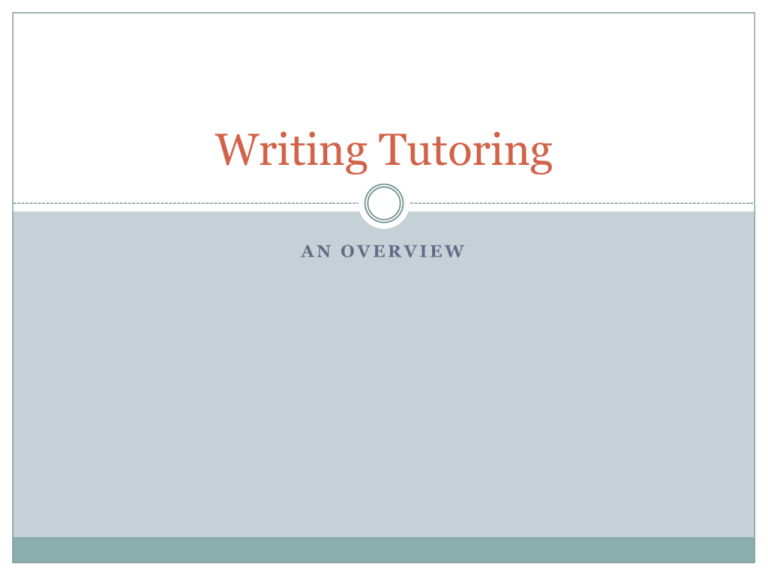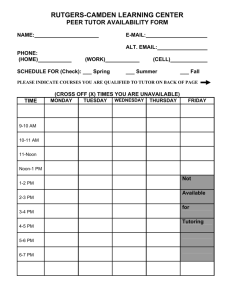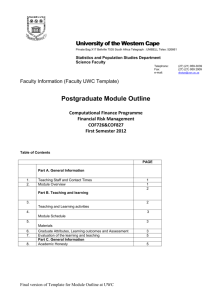Writing Tutoring - The University of West Georgia
advertisement

Writing Tutoring AN OVERVIEW First Off: The University Writing Center The University Writing Center (UWC) is a safe space for students to receive one-on-one tutoring. For ANY discipline At ANY level Student Needs Most frequent requests: Brainstorming Thesis/Topic Sentences Evidence Grammar Citations and References Understanding and/or Following the Prompt Revision help Style check Students may require assistance in more than one of the previous areas. Time Constraints Appointments are 30 minutes unless they are ESL (English as Second Language) or have a documented learning disability. If you are in a tutorial and do not have another tutorial afterwards, feel free to continue with the student until another arrives. Up to two appointments in one day but only three total in a week. It is important for students to understand that writing is a skill that takes practice, just like any other. Qualities of a Good Tutor Knowledgeable Integrity Empathy Flexibility Listening Skills Acceptance of Individual Differences Tutoring Process Step one: Ask what the student needs help with before looking at assignment. Step two: Inform the student of time constraints if he/she has multiple concerns. In some situations, the tutor may also identify a problem that the student did not express; it is the tutor’s prerogative if he/she wishes to address the other problems during the initial tutorial. Step three: Provide student with helpful strategies for future writing situations. Commenting Provide the students with as much feedback as possible without overwhelming and discouraging them. Make sure all criticism is constructive. Guide the student in the correct direction while being respectful. Content Concerns It is impossible to know about every piece of writing from a different discipline a student may bring in. For an assignment that might fall outside of English, it is best to help with argument structure instead. The tutor’s knowledge of a specific discipline is fortuitous for the student--not mandatory. Grading Consultation We do not evaluate student writing for a grade. If a student asks, politely inform them of the UWC’s policy and move on. Grading Consultation is only allowed when a student is meeting with his/her professor. Collaboration Prevention The pencil or pen (or keyboard) stays in the student’s hands. The student is the one who should be taking notes during the tutorial, not the tutor. If the tutor does write something down, do not use full sentences. Model writing for the students without giving them all of the answers. Create examples for the student but use a different source text. Don’t let the student borrow your words. If a student likes a word the tutor uses to describe something, make sure they know how to define the word before they record it down in his/her notes. The paper needs to retain the student’s voice at all times. We are not a one -top shop for all of their writing needs where they can pick up a full draft to turn in for a grade. We are here to help, not hand-hold. Professionalism While the tutor might not agree with an assignment or comment made by a professor, never collude with a student during a tutorial. Do not succumb to the temptation to discredit another professor’s work in front of a student. If you have any concerns about a particular assignment, approach one of the UWC staff members. Professors deserve respect from their students. Behavioral Issues If you encounter rude, derisive, offensive, or disruptive behavior in a student, feel free to conclude the session and ask him/her to leave. If you encounter a problem dismissing a student, feel free to approach one of the UWC staff members. If a student pulls out a cell phone, feel free to conclude the session. Types of Difficult Students Georgia Southwestern State University Writing Center created a Prezi of the types of difficult students you will encounter: http://prezi.com/spdilc3onl5a/you-gotta-meet-me-halfwaytutoring-reluctant-writers/ ESL English as Second Language students sometimes require slightly more help than native-speaking students. ESL students receive one-hour tutorials. Documented Learning Disabilities Like ESL students, students with a documented learning disability receive additional time (1 hour) if desired. If the student is undocumented but you feel he/she could benefit from longer sessions, let one of the UWC staff members know. Tutor Comfort If a situation arises that you feel uncomfortable with or insecure about handling, let the UWC staff know. Any questions about anything not mentioned above or about a situation not listed, again, let one of the UWC staff members know.







